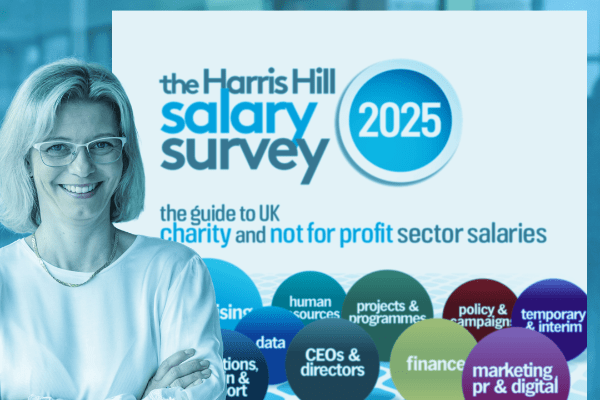If you want to be on every charity’s wish list when it comes to recruiting staff, becoming a data expert will certainly do the job. Harris Hill’s data recruitment specialist Shweta Prabhakar explains what’s driving the demand and the wealth of opportunities for data professionals from both within and beyond the charity sector.

___________________________________________________
Why charities need more data professionals
In 2016, we’re used to online retailers, apps and websites making ever-smarter use of our data: what kind of things we want, what motivates us to buy them and what else we might like. You might see a reminder about a purchase you didn’t complete, a menu that adapts to your previous preferences, or adverts for a holiday you once looked at following you around your newsfeed.
It’s an expanding area because it generates income, and exactly the same is true for charities. In the past year, Unicef UK generated an extra £100k just by making better use of the data they already had, so it’s easy to understand why third sector organisations of all kinds are starting to invest more in data specialists. At Harris Hill we saw a 26% rise in data roles in the year to April 2016, and in a recent survey, 82% of charities reported that while they’re collecting plenty of data, they lack the time and resources – essentially, the staff – to put it to good use. So we’re seeing that rise in vacancies continue.
There are more reasons for the rise in demand too, like changes in the fundraising landscape. Social media and other new digital channels offer charities all kinds of innovative ways to attract supporters and generate donations, but to be truly effective these depend on smart and skilful use of the organisation’s data – and the people who know how to do so. And while they’ve always been an important consideration, the ethical questions on storing, sharing and using supporters’ data have never been more high-profile, with many organisations needing to recruit more data talent to maintain the highest standards.
At the same time, many charities are under increasing pressure to become more accountable, to demonstrate exactly where donations go and the benefit they deliver. To the rescue? Data specialists again, who can track and analyse the organisation’s activities to provide this kind of information and help to inform future strategies.
What kind of roles are available?
Broadly speaking, there are three key roles in regular demand:
Data Officers who handle and work with the organisation’s data on a day-to-day basis, using packages like Raiser’s Edge (widely-used across the sector) and other CRM systems like Salesforce
Data Analysts with technical skills (typically SQL/SAS/SPSS) who focus on interpreting the data to identify patterns and trends, monitor effectiveness and provide key insights from the information
Data Managers, whose role may oversee or include the above two, but who will also work with fundraising, operational and marketing teams, helping them to harness the organisation’s data in order to drive more effective campaigns and better service delivery
In larger organisations (with bigger data teams) roles at each of these levels may specialise in particular areas like statistics, data quality/data cleansing, data segmentation and analysis – so there are numerous opportunities for people with specialist skills in these fields.
In a smaller charity, where you might be one of only a handful of data experts – if not the sole data guru – it’s more likely that you’ll need to be a bit of an all-rounder and cover most of these areas to some degree, which is a great option if you’re less keen to specialise and want to be closer to the impact your work has on the organisation.
What if you’re working in data and want to move into the charity sector?
Getting into the charity or not-for-profit sector isn’t always as easy as you might think: a great deal of roles advertised will insist on previous charity experience, and that’s often because the organisation lacks the resources to invest in training newcomers up.
The good news if you’re a data professional is that there is far more opportunity to move across from a commercial/private sector role and a variety of backgrounds. As a relatively new field, charities are well aware that there are simply not enough people already working in the sector with the requisite skills, so attracting talent from the commercial sector is vital in order to fill any gaps in knowledge and expertise.
You’ll need to be realistic that starting salaries will be a little lower than corporate equivalents – our 2016 salary survey can give you a good idea of what to expect – but being in high demand and short supply will continue to exert upward pressure, and progression can often be relatively swift once you’re established within an organisation and clearly adding value.
As with most charity sector roles, the slightly lower salary is a trade-off for what can often be a significantly better work-life balance, great culture fit, a more flexible and relaxed environment, and of course the opportunity to make a positive difference to the lives of others, or a particular cause that’s close to your heart.
You can usually expect a great deal of independence and autonomy too: this might be particularly appealing if you’re used to simply fitting in to a large company’s existing processes. Within a charity, you’re likely to be one of only a few data experts, and you may well be involved in setting up new initiatives and processes. So your input and ideas will not only be welcomed and valued, but could well go on to shape the future strategy of the organisation.
What if you’re considering data as a future career?
It’s a very smart choice indeed. A recent survey by Tableau Software indicated that 75% of organisations plan to invest in big data throughout 2017, and highlighted the disparity between the many jobs that will be available, and the low number of graduates currently focusing on relevant subjects – such as statistical analysis and data mining, which LinkedIn recently ranked as the number one skill to get you hired in the UK today.
The good news is that the options for training and education are increasing, with universities beginning to offer courses in data analytics, so for graduates, or indeed anyone looking to boost their employability and future job prospects, the data skills you learn will undoubtedly open doors, including to some brilliant opportunities in the charity sector!
They say data is the future of everything: and certainly as far as third sector careers go, we think they might well have a point.
___________________________________________________________
Whether you’re already working in charity data or elsewhere, do get in touch if you’d like to talk about current opportunities and potential routes for your career. I specialise in this area with charities right across the sector so I’d be delighted to help you and offer advice on working in this fast-growing field.
Shweta Prabhakar, Data Recruitment Specialist, Harris Hill
For further information and advice on getting into the charity sector, call Shweta or the data team on 020 7820 7320, email shweta.prabhakar@harrishill.co.uk or get in touch via info@harrishill.co.uk
-

Opportunity for all
Find out how we’re working to deliver more diverse, equitable and inclusive recruitment…
-

Recruiting a charity CEO?
Our executive recruitment specialists have an exceptional record of successful CEO, chair, trustee and…
-

Charity sector salaries
Our 2025 Salary Survey has the latest rates and expert insight for roles throughout the sector.













